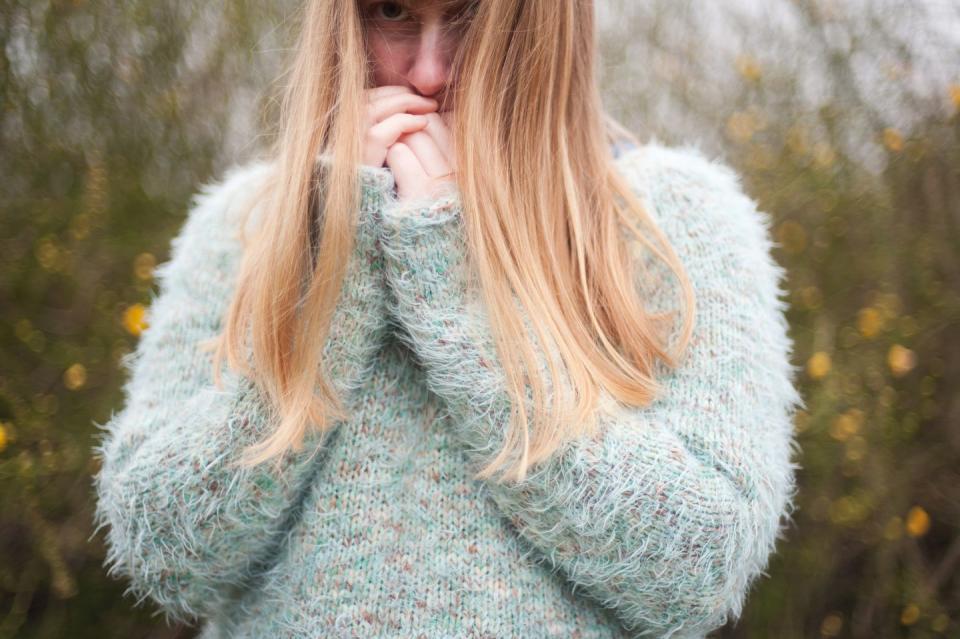What it means to have abandonment issues and a fear of abandonment

Relationships are a rollercoaster of emotions. But knowing how and why you behave the way you do in relationships can have a huge impact on how happy and healthy your relationships are. If you find yourself overly worried that the person you're in a relationship with will leave you, this could be a sign that you have a fear of abandonment. Fear of abandonment is sometimes referred to as abandonment issues and is usually rooted in an event from your past - and it can make it difficult to commit to and trust others in a relationship. Plus, it can also be combined with having an anxious or avoidant attachment style.
So, where does fear of abandonment come from, what are the signs, and how can you deal with it?
What is fear of abandonment?
"Fear of abandonment is an overwhelming dread that someone you love is going to leave and not come back," explains counsellor, psychotherapist and member of the British Association for Counselling and Psychotherapy (BACP), Lindsay George.
While we often think of fear of abandonment manifesting in romantic relationships, Lindsay says that this can also be experienced with a parent or friend, as well as a partner. Plus, it isn't necessarily always to do with being physically abandoned, but it can mean emotionally too.
"This may be experienced on a physical level, e.g. [thinking that] the person you are in a close relationship with will leave you, or [also] that they will abandon or neglect your emotional needs, leaving you feeling disconnected, unloved and alone, even though they remain present," Lindsay explains. "Either situation can hold you back in relationships with others."

Where does fear of abandonment come from?
Fear of abandonment is usually rooted in a traumatic experience, often to do with loss, in childhood and sometimes in adulthood too.
In childhood, this might include the loss of a parent through death or divorce, as well as childhood neglect, such as not getting enough physical or emotional care, Lindsay explains.
Meanwhile, in adulthood, fear of abandonment might develop after losing a partner through separation, divorce or death, or following a partner having affairs, or being deceived by your partner, explains Jo Coker, a psychosexual therapist and professional standards manager at COSRT.
Being in an abusive or controlling relationship can also lead to a fear of abandonment developing, Lindsay adds.

Signs of a fear of abandonment
If you or someone you're in a relationship with has a fear of abandonment, this can affect your (or their) behaviour, particularly when it comes to how you act in a relationship.
A lot of this is linked to your attachment style in relationships, and Jo says that people with a fear of abandonment will often have a "disordered attachment style", such as an avoidant attachment style, anxious attachment style, or disorganised attachment style.
For avoidants, "these people don’t allow anyone to get close to them and they may appear distant, cold and lacking in empathy which can affect close relationships and intimacy," Jo explains.
In the case of anxious attachers, "these people tend to be fearful of losing a relationship and may develop dependent relationships," says Jo. "They may constantly seek reassurance [that] they are loved and that everything is OK which can exhaust the partner."

Meanwhile for those with a disorganised attachment style, "these people tend to be inconsistent in relationships and can have difficulty remaining in relationships," Jo explains. "They can blow hot and cold very quickly. 'I hate you' one minute, 'I love you' the next. The disorganised person can be very hard to read, [and] often volatile and unpredictable," she adds.
Having a fear of abandonment can also mean that you sabotage an otherwise healthy relationship, says Lindsay. "This can often lead an individual to close themselves off emotionally in order to avoid potentially getting hurt, or it can make them inadvertently sabotage a relationship so that the person will eventually leave, therefore making sense of their narrative [by] proving that others should never be fully trusted," Lindsay explains.
Plus, if your fear of abandonment means you have trust issues, this can also cause you to become suspicious of your partner, she adds.
According to Lindsay, other signs of a fear of abandonment can include:
Difficulty committing to a relationship
Being overly sensitive to criticism
Difficulty trusting others
Difficulty making friends
Low self-esteem
Fear of intimacy
Staying in a relationship even if it's not healthy for you
Working too hard to please the other person
How to cope with a fear of abandonment

Work out where your fear comes from
Lindsay says the key to dealing with a fear of abandonment is to try to get the root of where it comes from for you. "The first step in overcoming your fear is to acknowledge why you feel this way," she explains, adding that you might choose to do this on your own or through therapy.
Figuring this out might mean grieving for what you've lost in the past, understanding how the situation felt then and how it feels now, and responding to your younger self with more compassion, says Lindsay.
As well as helping you work through your feelings, talking to a therapist might also help you feel more able to share your feelings with the person you're in a relationship with, when you feel ready to.
Identify negative thought patterns
Having a fear of abandonment might mean you have negative thoughts, like thinking the person you love will leave you, or having trouble trusting people.
"In therapy, learning to identify negative thought processes and replacing these with healthier, more balanced ones can be helpful," Lindsay explains .
Self-care
Self-care that works on boosting your self-esteem can also be helpful in making you feel more secure in yourself, especially if low self-esteem is something you struggle with.
"Learning self-care is very important for those who suffer from abandonment issues, and building self-worth based on your own, not others', opinions is vital," says Jo. This is also something that is helpful to work on in therapy, or through specific types of therapy like social skills training (SST), she adds.
You can find a therapist using the directory on the BACP website. Find a COSRT-accredited therapist here.
SUBSCRIBE HERE to have Cosmopolitan delivered to your door.
Like this article? Sign up to our newsletter to get more articles like this delivered straight to your inbox.
LOOKING FOR YOUR NEXT FAVOURITE PODCAST? LISTEN TO COSMOPOLITAN'S ALL THE WAY WITH... ON APPLE PODCASTS, SPOTIFY, ACAST
You Might Also Like

 Yahoo Finance
Yahoo Finance 